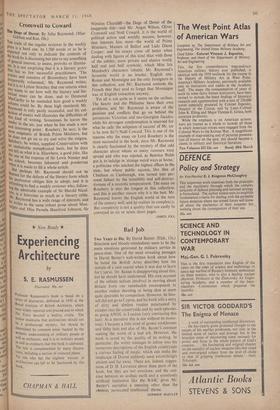Cromwell to Coward
THE trade of the regular reviewer in the weekly press is a hard one. In 1,500 words or so he is expected not only to indicate the contents of the book he is discussing but also to say something of general interest, to assess, provoke or illumin- ate. It is not surprising that it is a literary genre that has so few successful practitioners. 'The praises and censures of Bloomsbury have been temporarily exhausted,' Mr. Raymond writes; out it is to Lytton Strachey that one returns whe. n
toneal
One, wants to see how well the literary and his- essay can be done, and to Desmond MacCarthy to be reminded how good a weekly column could be. By these high standards Mr. Raymond is only partly successful, and his col- rect. Inn of essays well illustrates the difficulties of this kind of writing. Sometimes he leaves the reader in the air, just when he has made a new and interesting point : Rosebery, he says, is the most enigmatic of British Prime Ministers, but he .does not go on to try and solve the enigma. Salisbury, he writes, supplied Conservatism with 'II unshakable metaphysical basis, but he do es not tell us what it is. Elsewhere, a good joke, like the one at the expense of Sir Lewis Namier and ,w,5 school, becomes laboured and ponderous Whenit is made to fill a whole article. blamedhut perhaps Mr. Raymond should not .be ,. for the defects of the literary form which _Ills profession obliges him to adopt, and it is irefreshing to find a weekly reviewer who, follow- srigthe admirable example of Sir Harold Nico1- n, is a historian as much as a literary critic. Raymond has a wide range of interests, and writes in the same robust prose about Mon- algne and Miss Pamela Hansford Johnson, Sir Winston Churchill—the Doge of Dover of the inapposite title—and Mr. Angus Wilson, Oliver Cromwell and Noel Coward. It is the world of political action and worldly success, however, that interests him most—the world of Prime Ministers, Masters of Balliol and Lady Diana Cooper; and his essays come off better when dealing with figures of this kind than with those of the subtler, more private and elusive world, half real and half symbolic, which Miss Iris Murdoch's characters inhabit. Mr. Raymond's favourite world is an insular. English one; Ronan and Montaigne are the only foreigners in this collection, and Mr. Raymond reminds the French that they tend to forget that Montaigne was of English extraction anyway.
Yet all is not quite as it seems on the surface. The hearty and the Philistine have their own problems, and Mr. Raymond is aware of the passions and conflicts that go on behind the portentous Victorian and neo-Georgian facades, while his strongest condemnation is reserved for what he calls 'the solipsism of success' of Mr. (or is he now Sir?) Noel Coward. This is one of the reasons why the essay on Lord Rosebery is the most successful in the book, since Mr. Raymond is clearly fascinated by the mystery of that odd character about whom so many rumours were spread and who was reputed, as Beatrice Webb put it, to indulge in 'strange weird ways at home,' a politician who reached the highest offices in the state, but whose public success, like that of Chatham or Castlereagh, was turned into per- sonal failure by the instability and self-destruc- tiveness of a neurotic temperament. The essay on Rosebery is also the longest in this collection, and this is another reason why it is the best. Mr. Raymond knows the English world at the turn of the century well, and he realises its complexity. But complexity is not a quality that can easily be conveyed in six or seven short pages.
JAMES JOLL










































 Previous page
Previous page